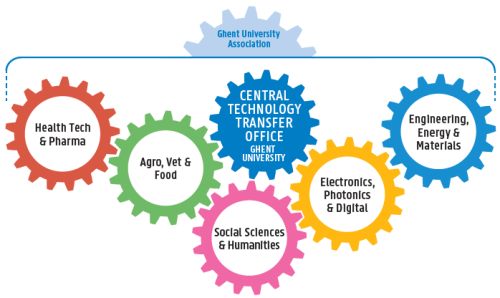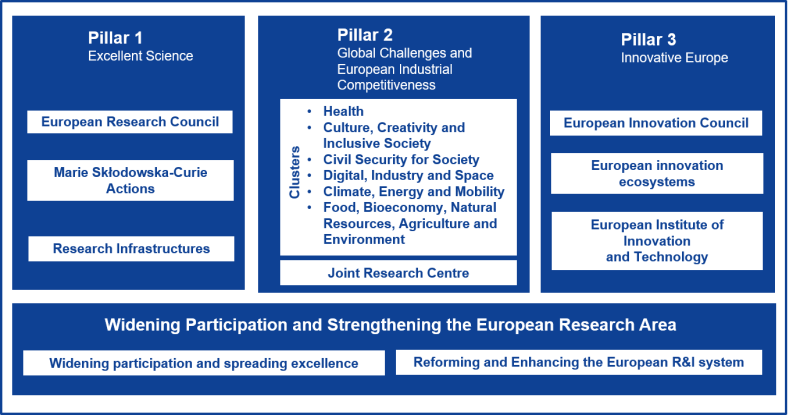1. Roadmap
- innovative research, solving a clear patient/market need,
- complementary research partners (academic and/or industrial),
- fitting funding channel,
- and a sound and convincing research proposal.
At the IVU, we can support you with these building blocks. This can make the difference, as a well-prepared research proposal stands a better chance of being granted.
Please contact us at least 3 weeks before the submission. This enables us to provide qualitative advice and support.
2. Funding channels
A wide range of funding channels exist, going from internal to national, European and global ones (see below for more detail). The majority of research funding comes from corporations and governments. A smaller amount of scientific research is funded by charitable foundations.
An important difference exists between personal research grants (= fellowships or mandates) and project funding. Fellowships and mandates are personal and non-transferable and are often used to obtain a PhD or pursue a Postdoc, while project funding often entails a research group or a consortium of different partners (academic and/or industrial).
Some unique funding channels for clinicians are: The Fund for Innovation and Clinical Research (Fonds voor Innovatie en Klinisch Onderzoek, FIKO), FWO-Applied Biomedical Research (Toegepast Biomedisch Onderzoek, TBM), FWO-Senior Clinical Investigator (Fundamenteel Klinisch Mandaat, FKM), and KCE. For more detail, see below.
Keep in mind that the presented list of funding channels on this webpage is non-exhaustive.
2.1. UZ Gent
The Fund for Innovation and Clinical Research (Fonds voor Innovatie en Klinisch Onderzoek, FIKO) is an internal funding channel from UZ Gent.
FIKO is divided into Type I and Type II projects:
- Type I projects: Clinicians who want to complete a PhD in Medical Sciences
- Type II projects: Clinicians who want to develop diagnostic, therapeutic or digital processes
More information: Fonds voor Innovatie en Klinisch Onderzoek – UZ Gent
2.2. National
Various national funding channels exists, of which some important ones are:
An overview can also be found on the UGent webpage on funding (link).
2.2.1. FWO – Fund for Scientific Research (Fonds voor Wetenschappelijk Onderzoek)
The Fund for Scientific Research is a Flemish funding channel. FWO provides funding for:
- Predoctoral mandates
- Fundamental research (i.e. former classic FWO fellowships)
- Strategic basic research (i.e. former IWT)
- Postdoctoral mandates
- Junior and senior postdoctoral fellowships
- Senior Clinical Investigator (Fundamenteel Klinisch Mandaat, FKM)
- This fellowship grant is intended to exempt the fellow half-time from clinical duties and provide replacement, allowing them to conduct research. The duration is 5-year part-time research, twice renewable, with a maximum amount of € 60,000 per year. Calls for FKM are open once per year, with a deadline around March (link).
- Research projects
- Junior and senior research projects
- Strategic Basic Research (SBO)
- Applied Biomedical Research (Toegepast Biomedisch Onderzoek, TBM)
- For research which contribute to the implementation of (new) therapies, diagnostic techniques and preventive methods, which, without government funding, would not make it to the patient due to a lack of industrial interest. The project duration is 2-4 years, with a maximum amount of € 850,000 and € 1,275,000 for large or multicentric trials. Calls for TBM are open once per year, with a deadline around March (link).
- Infrastructures (medium and large (i.e. former Hercules), international)
- International mobility and collaboration
- Sabbatical bench fee
The conditions and criteria for each type are explained in detail on the FWO webpage (link).
2.2.2. VLAIO – The Flanders Innovation & Entrepreneurship (Vlaams Agentschap Innoveren en Ondernemen)
VLAIO is the contact point for entrepreneurs in Flanders and provides funding for:
- Predoctoral mandates (Baekeland)
- Postdoctoral mandates (Innovation mandate I and II)
- Research projects (Research & Development (O&O))
Important to note is that companies always need to be involved. The conditions and criteria for each type are explained in detail on the VLAIO webpage (link).
2.2.3. KCE – The Belgian Health Care Knowledge Center (Federaal Kenniscentrum voor de Gezondheidszorg)
Is an independent research centre that provides scientific advice on topics related to health care in Belgium. It has a programme, the KCE Trials, to publicly fund non-commercial, practice-oriented clinical trials. The studies address questions that are generally not studied by industry, despite their high social importance. The conditions and criteria are explained in detail on the KCE webpage (link).
2.2.4. Cancer-related research funding (Stichting Tegen Kanker & Kom op Tegen Kanker)
Stichting Tegen Kanker: is a national and independent center of expertise in the fight against cancer in Belgium. The organization provides funding for research projects (fundamental, translational, or clinical) and postdoctoral mandates (fundamental or clinical). The conditions and criteria are explained in detail on the STK webpage (link).
Kom op Tegen Kanker: is a non-governmental, Flemish organization committed to providing the best treatment and care for cancer patients, and the right of people to a healthy living environment. The organization also invests in scientific research for better cancer prevention. The conditions and criteria are explained in detail on the KoTK webpage (link).
2.2.5. IOF – Industrial Research Fund (Industrieel Onderzoeksfonds)
Is an internal funding channel from UGent. It provides a supporting framework for collaboration between the Ghent University Association and industry, through the Industrial Liaison Network.

IOF funding can be applied at crucial stages of the development track of valorisation-oriented projects to offer valuable support to research results/technology with clear value-adding potential. Depending the development track stage, there are different types (i.e. ConnecTT, StarTT, ConcepTT, Advanced, Stepstone; each type is open for submission 4 times per year). The conditions and criteria for each type are explained in detail on the UGent webpage on IOF (link).
2.2.6. BOF – Special Research Fund (Bijzonder Onderzoeksfonds)
Is an internal funding channel from UGent. BOF provides funding for mandates (predoctoral, postdoctoral and professorial-staff level), projects, operational costs, personnel costs, equipment costs and others. The conditions and criteria for each type are explained in detail on the UGent webpage on BOF (link).
2.3. European
Around 40 European funding programmes currently exists. These are thematic programmes established over several years (often 7) and are aimed at tackling a particular challenge or supporting a particular sector. For us, the most important programmes that run from 2021 to 2027 are: ‘Horizon Europe’, ‘EU4Health’ and ‘The Digital Europe Programme’. Within these programmes, ‘Europe’s Beating Cancer Plan’ and ‘European Partnerships for Health’ are important initiatives. More information in presented below.
When applying for EU funding, it is important to take the following into account:
- European funding programmes are designed to implement the European policy framework. In other words, your project needs to provide an answer to the challenges which the European Union is facing. In addition, your solution needs to be applicable in all EU Member States.
- Target audience. Depending on the funding programme, companies, local authorities, non-profit institutions, research and/or educational institutions are eligible for funding. While each legal entity is eligible for funding, individuals are rarely (exception: Erasmus, ERC).
- International cooperation. European funding is all about the exchange of knowledge and experience across Member States. As such, at least two partners from two different EU countries are often required for a project.
- Co-financing. The European Commission will almost never fund the full 100% of your project (i.e. pay a part yourself and/or look for extra financing). This percentage depends on the target group and the funding programme (e.g. Research & Innovation Actions: 100% funded).
- Innovation and Sustainability. Projects must be innovative and sustainable.
- Applying for European funding takes time. The draft versions of the annual working programs are best read in advance, as the time between call opening and submission deadline is fairly short. In contrast, the time between submission and the start of the project is fairly long (8 months).
2.3.1. Horizon Europe – Focus on research and innovation
Horizon Europe is the EU’s key funding programme for research and innovation. In general, it aims to tackle climate change, to help to achieve the UN’s Sustainable Development Goals, and to boost the EU’s competitiveness and growth.
Horizon Europe consists of 3 pillars: i) excellent science, ii) global challenges and European industrial competitiveness, and iii) innovative Europe. Each pillar consists of several actions. In addition, the programme is supported by overarching activities that widen and strengthen its impact (e.g. European partnerships). The co-financing percentage varies from 25% to 100% depending on pillar, action, and target group.
More information on Horizon Europe can be found on the following link.

2.3.2. EU4Health – Focus on education, training and guidelines
EU4Health is the fourth EU Health Programme and is the EU’s response to the COVID-19 pandemic. Its aims are to i) improve & foster health, ii) protect against cross-border threats, iii) improve medicinal products & devices, and crisis-relevant products, and iv) strengthen health systems. Its health priorities are on cancer, antimicrobial resistance and vaccination rates.
The funding rate is maximum 60% and overhead is 7%. Projects can be submitted as a sole participant or as a consortium (≥ 3 organisations from ≥ 3 countries), depending on the call type. Project proposals need to have a strong focus on education, training, and guidelines development.
More information on EU4Health can be found on the following link.
2.3.3. Digital Europe Programme
The Digital Europe Programme is a new EU funding programme focused on bringing digital technology to businesses, citizens and public administrations. It will provide funding for projects in five crucial areas: supercomputing, artificial intelligence, cybersecurity, advanced digital skills, and ensuring the wide use of digital technologies across the economy and society.
More information on the Digital Europe programme can be found on the following link.
2.3.4. Europe’s Beating Cancer Plan
Europe’s Beating Cancer Plan is a political commitment to turn the tide against cancer. It is being funded by several programmes, including EU4Health, Horizon Europe, Erasmus+ / EIT / MSCA and the Digital Europe programme. The Cancer Plan is structured around 4 key action areas with 10 flagship initiatives and multiple supporting actions.
More information on the EU’s Beating Cancer Plan can be found on the following link.
2.3.5. Partnerships for health
European Partnerships bring together the European Commission and private and/or public partners to address some of Europe’s most pressing challenges through concerted research and innovation initiatives. They are a key implementation tool of Horizon Europe, and contribute significantly to achieving the EU’s political priorities. The EU Partnerships will also launch calls for proposals. There are 9 partnership initiatives around health in total.
More information on the different partnerships for health can be found on the following link.
2.4. Miscellaneous
Various other funding opportunities exist, of which some examples are:
- King Baudouin Foundation: is an independent and pluralist public utility foundation from Belgium. It supports organizations and citizens who are working for the common good in numerous fields such as health, the fight against poverty, the environment and heritage, in Belgium, as well as internationally. Calls for funding on a wide range of topics are regularly launched and can be found on the KBF webpage (link).
- Foundation Fournier-Majoie: promotes the success of innovative cancer research projects by providing entrepreneurial skills and financial resources to researcher-finders (link).
- The National Institutes of Health (NIH): is part of the US Department of Health and Human Services and is the nation’s medical research agency (link).
- Bill & Melinda Gates Foundation: is a non-profit, global organization fighting poverty, disease, and inequity around the world. It primarily invests in two ways: grants and strategic investments (link).
- Global Innovation Fund: invests in innovations with strong potential for social impact at a large scale. These innovations can be new business models, policy practices, technologies, behavioural insights, or ways of delivering products and services that benefit the poor in developing countries (link).
- The Human Frontier Science Program: promotes international collaboration in basic research focused on the elucidation of the sophisticated and complex mechanisms of living organisms. It funds both research projects and fellowships (link).
- …